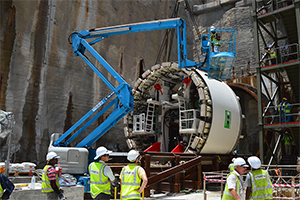
Economic growth in Thailand, Indonesia, the Philippines, Vietnam and Malaysia will remain strong at an average 6% this year, according to the International Monetary Fund. The countries represent the top five economies of the Association of Southeast Asian Nations, or ASEAN.
While China’s recovery is “foggy,” with a growth rate of 7.8% last year to a forecasted 8.2% in 2013 and 8% in 2014, “ASEAN’s economy is resilient, and the strong performance will continue as the economic community integrates,” says Changyong Rhee, Asian Development Bank (ADB) chief economist.
ADB has estimated ASEAN nations will need about $583.1 billion of infrastructure investment by 2020 in powerplants, transportation, water and sanitation, and telecommunication works, of which $382.6 billion, or 66%, will be for building new capacity and $200.5 billion, or 34%, for maintenance, presenting a vast opportunity for future investors.
Across Southeast Asia, massive infrastructure projects are being planned or implemented, including many in Malaysia, which has more than $57.5 billion committed in investments. The construction of a new mass rapid-transit line in Kuala Lumpur, estimated to be worth more than $10 billion, has recently started. Next year, the government will spend $16 billion on roads, railways and hospitals.
In Penang, the Malaysian-Chinese joint-venture Consortium Zenith BUCG, which includes Chinese firms China Railway Construction Corp. Ltd. and Beijing Urban Construction Group, will bear the financial cost of a $2-billion road infrastructure project that includes a tunnel and three new roads for the island under a 30-year concession agreement.
“There is not going to be any cash exchange. It is only a land-swap deal [in which] 110 acres of land have been offered to them,” says Penang Chief Minister Lim Guan Eng. "We are maximizing the opportunity."
In neighboring Singapore, the construction sector has slowed down this year due to the lack of trade activity, a major driver of non-residential construction.
“Real growth for Singapore's construction sector is expected to reach 5.1% in 2013, lower than the 8.7% estimated for 2012. That said, there are still significant growth opportunities in the construction sector in 2013, particularly in the infrastructure and residential sectors,” says a Business Monitor International report.
“Singapore is expanding and upgrading its infrastructure, and we are looking at a long-term plan to cater to a six-million local and resident population,” says Goh Poh Khim, executive director of Koh Bros.' construction unit.
A major challenge is the demand for skilled labor. The Singapore government is “tightening the influx of cheap labor to wean off dependence on foreign labor," adds Goh. "At the same time, we are encouraged to increase our productivity, which is at a low compared with other developing economies."
Thailand’s government last month approved a $68-billion loan proposed by the Transport Ministry for high-speed railways and other transportation megaprojects. The roughly 57 nationwide projects range from train lines to airport upgrades. Bangkok SkyTrain operator BTS Group Holdings is set raise $2.13 billion in Thailand's biggest initial public offering following strong investor interest, even as Thailand is on track for a second straight year of robust economic growth.


Post a comment to this article
Report Abusive Comment